
SQL-AI-samples
Samples using AI and Azure SQL DB
Stars: 65
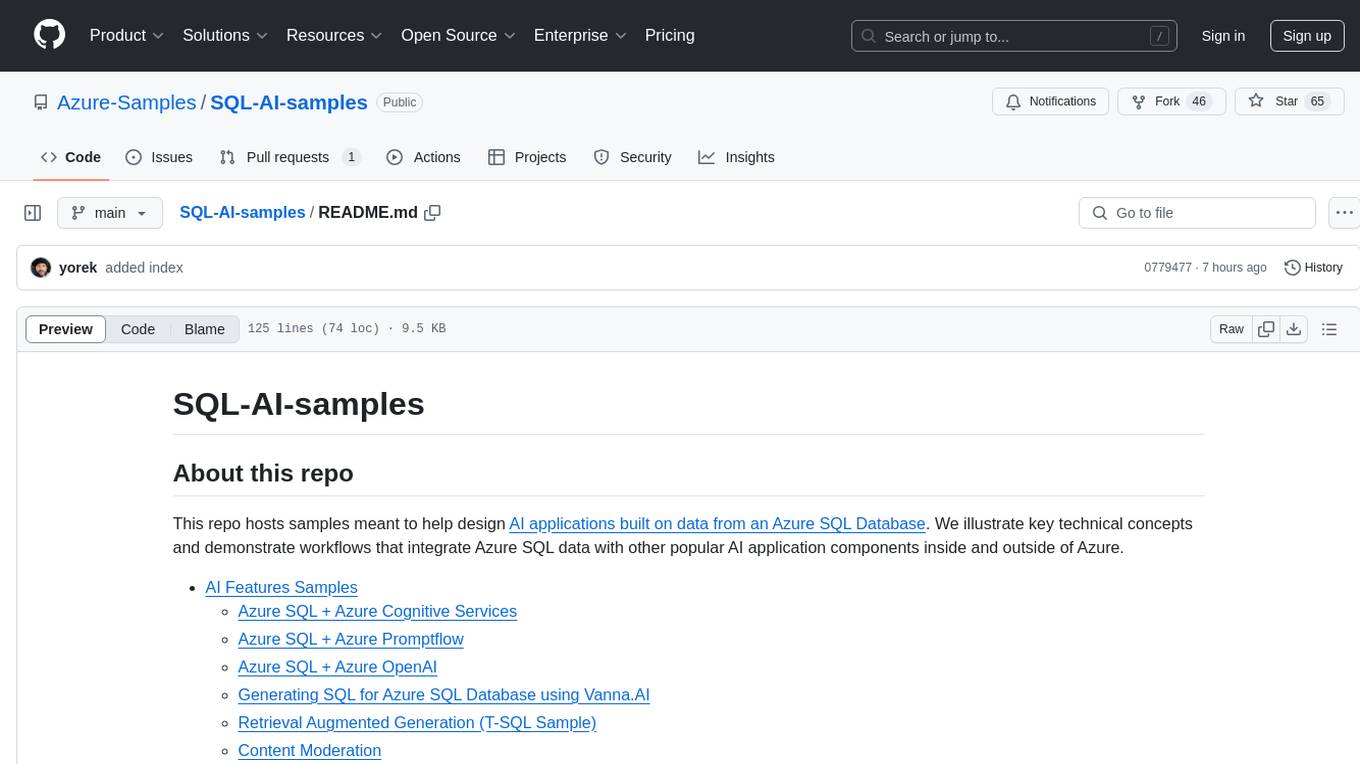
This repository contains samples to help design AI applications using data from an Azure SQL Database. It showcases technical concepts and workflows integrating Azure SQL data with popular AI components both within and outside Azure. The samples cover various AI features such as Azure Cognitive Services, Promptflow, OpenAI, Vanna.AI, Content Moderation, LangChain, and more. Additionally, there are end-to-end samples like Similar Content Finder, Session Conference Assistant, Chatbots, Vectorization, SQL Server Database Development, Redis Vector Search, and Similarity Search with FAISS.
README:
This repo hosts samples meant to help design AI applications built on data from an Azure SQL Database. We illustrate key technical concepts and demonstrate workflows that integrate Azure SQL data with other popular AI application components inside and outside of Azure.
- AI Features Samples
-
End-To-End Samples
- Similar Content Finder
- Session Conference Assistant
- Chatbot on your own data with LangChain and Chainlit
- Chatbot on structured and unstructured data with Semantic Kernel
- Azure SQL DB Vectorizer
- SQL Server Database Development using Prompts as T-SQL Development
- Redis Vector Search Demo Application using ACRE and Cache Prefetching from Azure SQL with Azure Functions
- Similarity Search with FAISS and Azure SQL
The AzureSQL_CogSearch_IntegratedVectorization sample notebook shows a simple AI application that recommends products based on a database of user reviews, using Azure Cognitive Search to store and search the relevant data. It highlights new preview features of Azure Cognitive Search, including automatic chunking and integrated vectorization of user queries.
The AzureSQL_Prompt_Flow sample shows an E2E example of how to build AI applications with Prompt Flow, Azure Cognitive Search, and your own data in Azure SQL database. It includes instructions on how to index your data with Azure Cognitive Search, a sample Prompt Flow local development that links everything together with Azure OpenAI connections, and also how to create an endpoint of the flow to an Azure ML workspace.
This example shows how to use Azure OpenAI from Azure SQL database to get the vector embeddings of any choosen text, and then calculate the cosine similarity against the Wikipedia articles (for which vector embeddings have been already calculated,) to find the articles that covers topics that are close - or similar - to the provided text.
https://github.com/Azure-Samples/azure-sql-db-openai
This notebook runs through the process of using the vanna Python package to generate SQL using AI (RAG + LLMs) including connecting to a database and training.
In this repo you will find a step-by-step guide on how to use Azure SQL Database to do Retrieval Augmented Generation (RAG) using the data you have in Azure SQL and integrating with OpenAI, directly from the Azure SQL database itself. You'll be able to ask queries in natural language and get answers from the OpenAI GPT model, using the data you have in Azure SQL Database.
https://github.com/Azure-Samples/azure-sql-db-chatbot
In this folder are two T-SQL scripts that call Azure OpenAI Content Safety and Language AI. The Content Safety example will analyze a text string and return a severity in four categories: violence, sexual, self-harm, and hate. The Language AI script will analyze text and return what PII it found, what category of PII it is, and redact the results to obfuscate the PII in the original text string.
https://github.com/Azure-Samples/SQL-AI-samples/tree/main/AzureSQLDatabase/ContentModeration
This folder contains 2 python notebooks that use LangChain to create a NL2SQL agent against an Azure SQL Database. The notebooks use either Azure OpenAI or OpenAI for the LLM. To get started immedietly, you can create a codespace on this repository, use the terminal to change to the LangChain directory and follow one of the notebooks.
https://github.com/Azure-Samples/SQL-AI-samples/tree/main/AzureSQLDatabase/LangChain
OpenAI embeddings, and thus vectors, can be used to perform similarity search and create solution that provide customer with a better user experience, better search results and in general a more natural way to find relevant data in a reference dataset. Due to ability to provide an answer even when search request do not perfectly match a given content, similary search is ideal for creating recommenders. A fully working end-to-end sample is available here:
https://github.com/Azure-Samples/azure-sql-db-session-recommender
This sample demonstrates how to build a session assistant using Jamstack, Retrieval Augmented Generation (RAG) and Event-Driven architecture, using Azure SQL DB to store and search vectors embeddings generated using OpenAI. The solution is built using Azure Static Web Apps, Azure Functions, Azure SQL Database, and Azure OpenAI. A fully working, production ready, version of this sample, that has been used at VS Live conferences, is available here: https://ai.microsofthq.vslive.com/
https://github.com/azure-samples/azure-sql-db-session-recommender-v2
Sample RAG pattern, with full UX, using Azure SQL DB, Langchain and Chainlit as demonstrated in the #RAGHack conference. Full details and video recording available here: RAG on Azure SQL Server.
https://github.com/Azure-Samples/azure-sql-db-rag-langchain-chainlit
A chatbot that can answer using RAG and using SQL Queries to answer any question you may want to ask it, be it on unstructured data (eg: what is the common issue raised for product XYZ) or on structured data (eg: how many customers from Canada called the support line?). Built using Semantic Kernel.
https://github.com/Azure-Samples/azure-sql-db-chat-sk
Quickly chunk text and generate embeddings at scale with data from Azure SQL.
https://github.com/Azure-Samples/azure-sql-db-vectorizer
In this notebook, we will learn how to use prompts as a way to develop and test Transact-SQL (T-SQL) code for SQL Server databases. Prompts are natural language requests that can be converted into T-SQL statements by using Generative AI models, such as GPT-4. This can help us write code faster, easier, and more accurately, as well as learn from the generated code examples.
Redis Vector Search Demo Application using ACRE and Cache Prefetching from Azure SQL with Azure Functions
We based this project from our Product Search Demo which showcase how to use Redis as a Vector Db. We modified the demo by adding a Cache Prefetching pattern from Azure SQL to ACRE using Azure Functions. The Azure Function uses a SQL Trigger that will trigger for any updates that happen in the table.
https://github.com/AzureSQLDB/redis-azure-ai-demo
This contains Python notebooks that integrate Azure SQL Database with FAISS for efficient similarity search. The notebooks demonstrate how to store and query data in Azure SQL, leveraging FAISS for fast similarity search. We will be demonstrating it with Wikipedia movie plots data stored in Azure SQL. We’ll encode these movie plots into dense vectors using a pre-trained model and then create a FAISS index to perform similarity searches. Learn more in the detail blog and video: https://aka.ms/azuresql-faiss
https://github.com/Azure-Samples/SQL-AI-samples/tree/main/AzureSQLFaiss
See the description in each sample for instructions (projects will have either a README file or instructions in the notebooks themselves.)
This project may contain trademarks or logos for projects, products, or services. Authorized use of Microsoft trademarks or logos is subject to and must follow Microsoft's Trademark & Brand Guidelines. Use of Microsoft trademarks or logos in modified versions of this project must not cause confusion or imply Microsoft sponsorship. Any use of third-party trademarks or logos are subject to those third-party's policies.
For Tasks:
Click tags to check more tools for each tasksFor Jobs:
Alternative AI tools for SQL-AI-samples
Similar Open Source Tools

SQL-AI-samples
This repository contains samples to help design AI applications using data from an Azure SQL Database. It showcases technical concepts and workflows integrating Azure SQL data with popular AI components both within and outside Azure. The samples cover various AI features such as Azure Cognitive Services, Promptflow, OpenAI, Vanna.AI, Content Moderation, LangChain, and more. Additionally, there are end-to-end samples like Similar Content Finder, Session Conference Assistant, Chatbots, Vectorization, SQL Server Database Development, Redis Vector Search, and Similarity Search with FAISS.
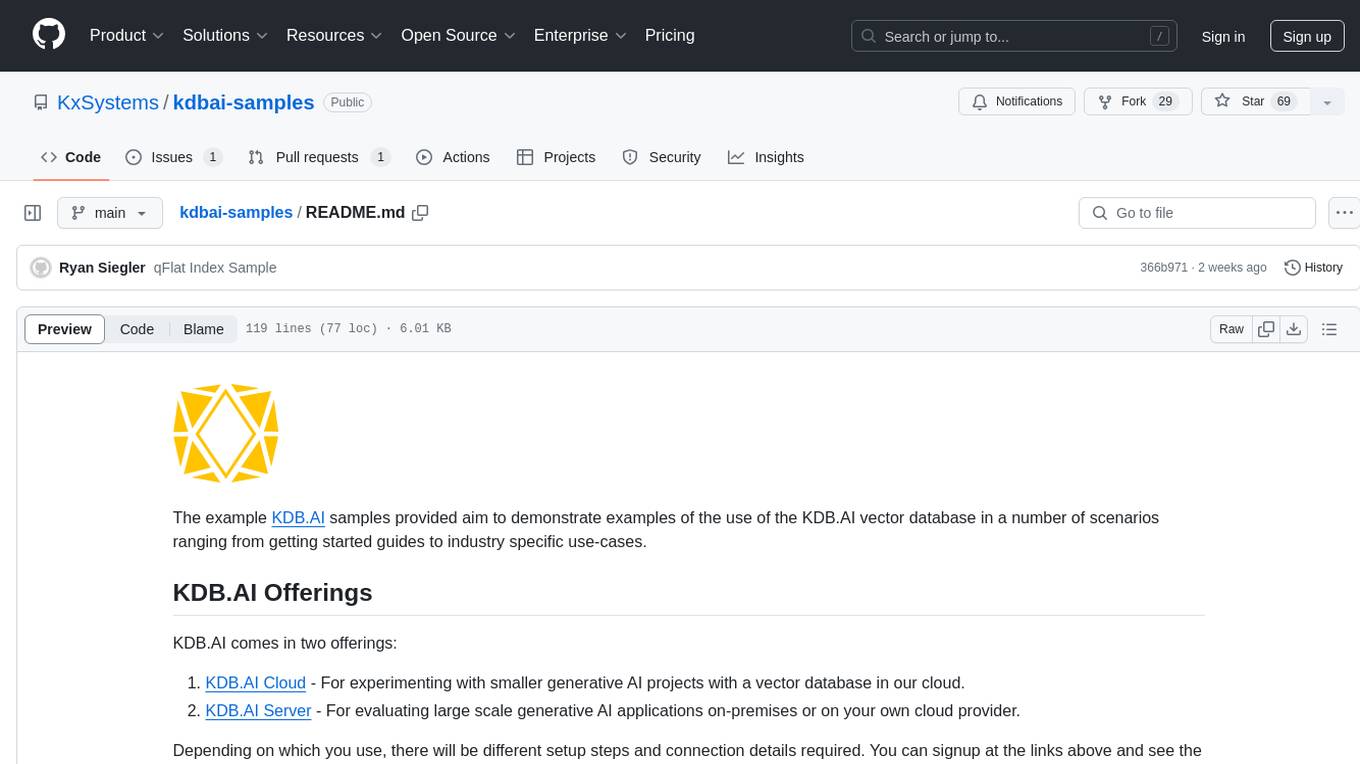
kdbai-samples
KDB.AI is a time-based vector database that allows developers to build scalable, reliable, and real-time applications by providing advanced search, recommendation, and personalization for Generative AI applications. It supports multiple index types, distance metrics, top-N and metadata filtered retrieval, as well as Python and REST interfaces. The repository contains samples demonstrating various use-cases such as temporal similarity search, document search, image search, recommendation systems, sentiment analysis, and more. KDB.AI integrates with platforms like ChatGPT, Langchain, and LlamaIndex. The setup steps require Unix terminal, Python 3.8+, and pip installed. Users can install necessary Python packages and run Jupyter notebooks to interact with the samples.
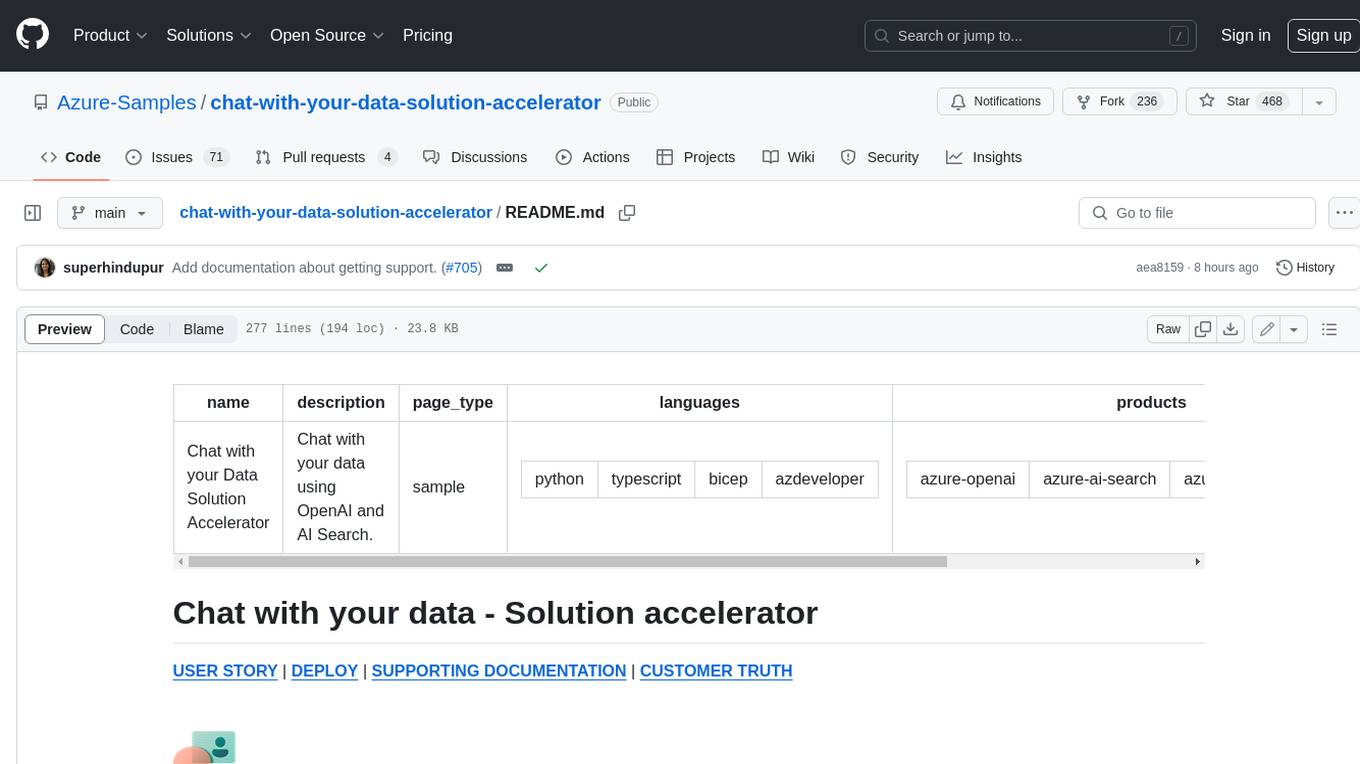
chat-with-your-data-solution-accelerator
Chat with your data using OpenAI and AI Search. This solution accelerator uses an Azure OpenAI GPT model and an Azure AI Search index generated from your data, which is integrated into a web application to provide a natural language interface, including speech-to-text functionality, for search queries. Users can drag and drop files, point to storage, and take care of technical setup to transform documents. There is a web app that users can create in their own subscription with security and authentication.
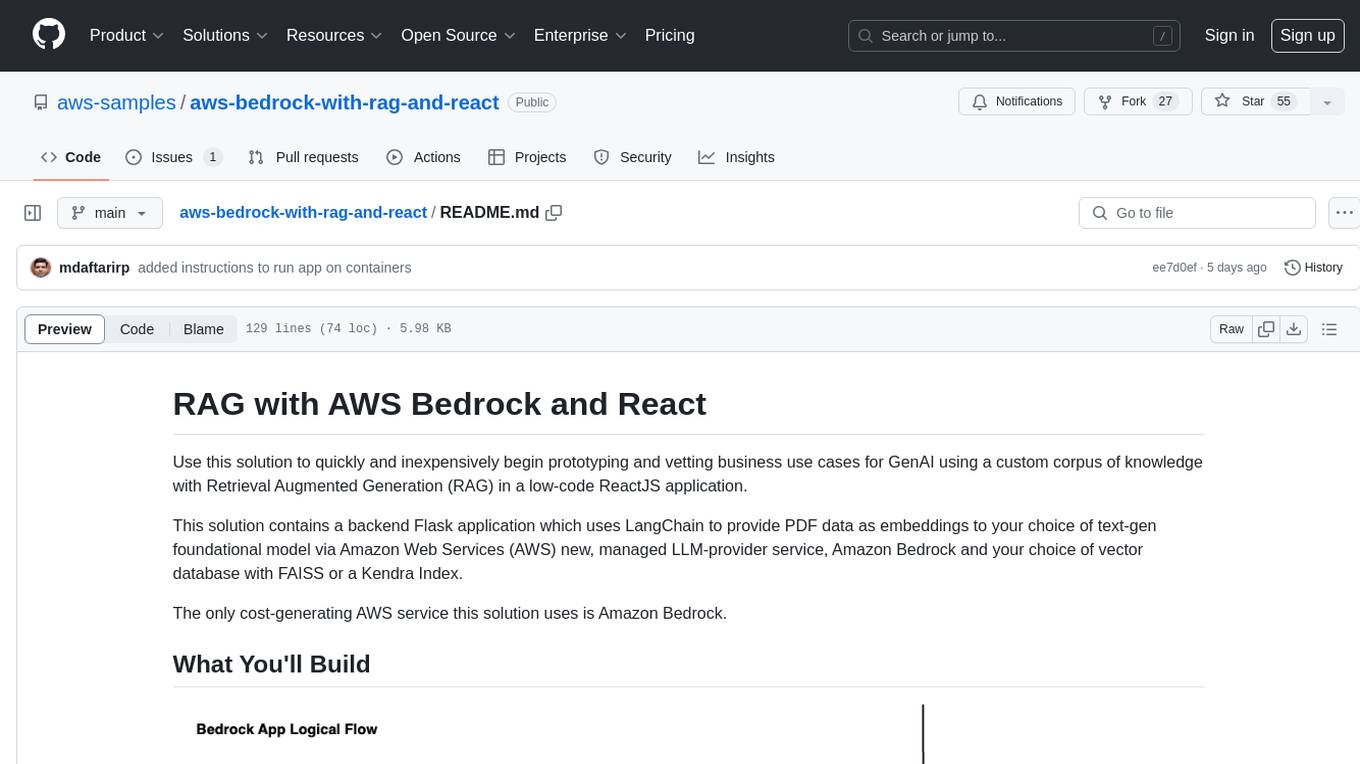
aws-bedrock-with-rag-and-react
This solution provides a low-code ReactJS application to prototype and vet business use cases for GenAI using Retrieval Augmented Generation (RAG). It includes a backend Flask application that uses LangChain to provide PDF data as embeddings to a text-gen model via Amazon Bedrock and a vector database with FAISS or Kendra Index. The solution utilizes Amazon Bedrock as the only cost-generating AWS service.
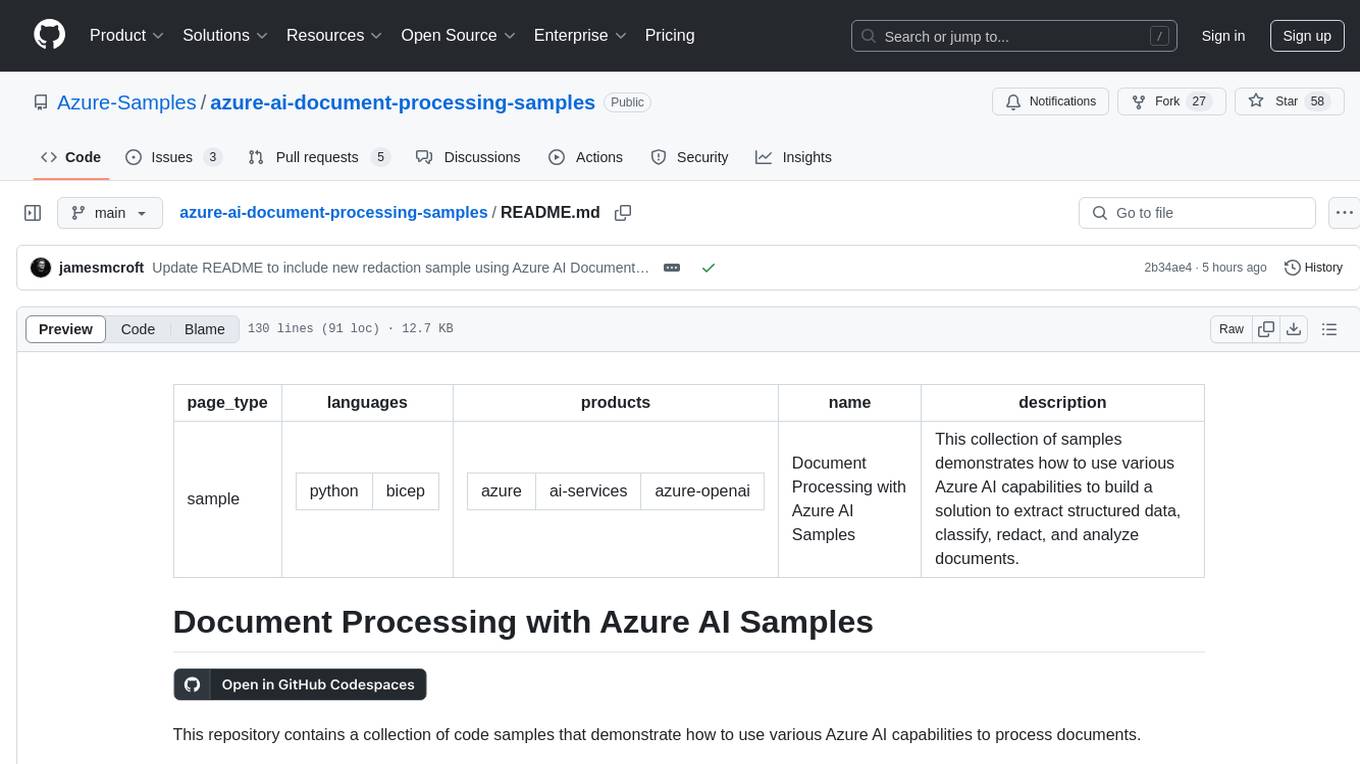
azure-ai-document-processing-samples
This repository contains a collection of code samples that demonstrate how to use various Azure AI capabilities to process documents. The samples help engineering teams establish techniques with Azure AI Foundry, Azure OpenAI, Azure AI Document Intelligence, and Azure AI Language services to build solutions for extracting structured data, classifying, and analyzing documents. The techniques simplify custom model training, improve reliability in document processing, and simplify document processing workflows by providing reusable code and patterns that can be easily modified and evaluated for most use cases.
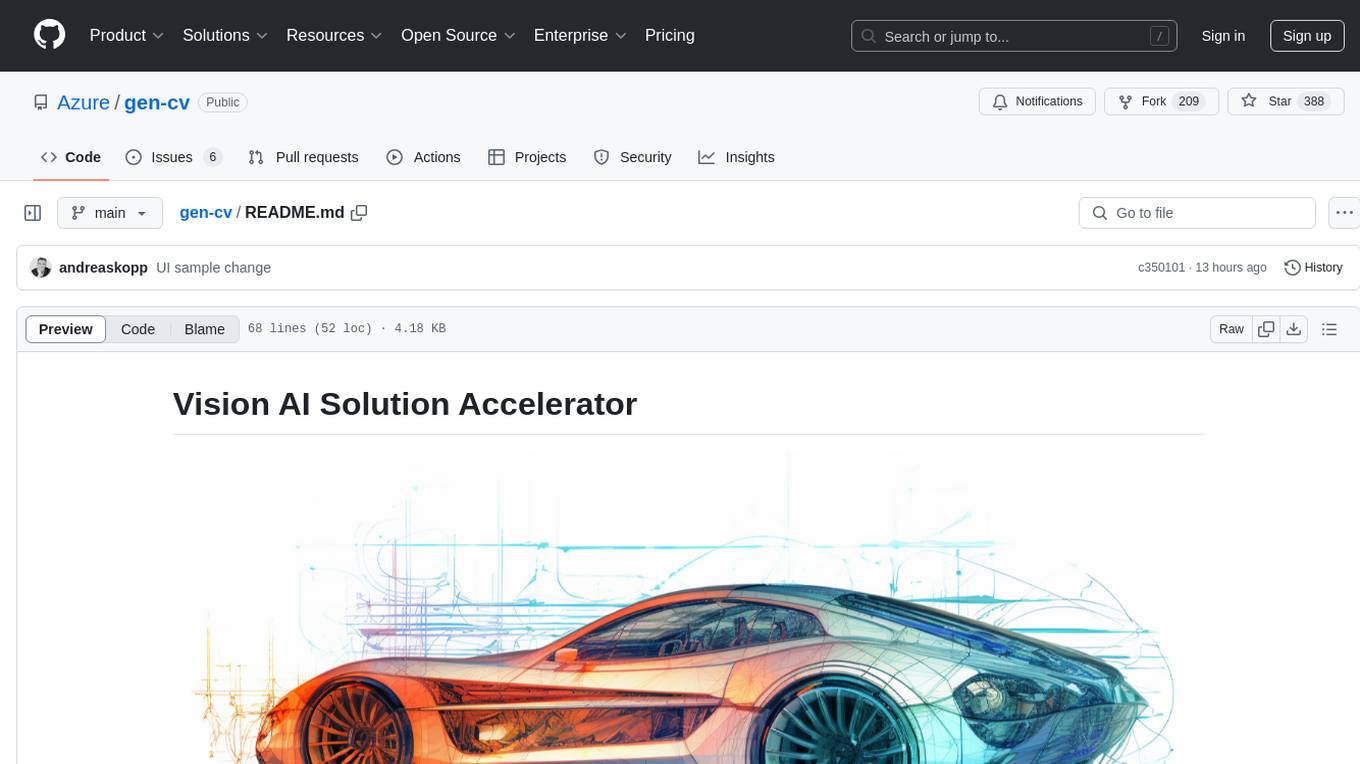
gen-cv
This repository is a rich resource offering examples of synthetic image generation, manipulation, and reasoning using Azure Machine Learning, Computer Vision, OpenAI, and open-source frameworks like Stable Diffusion. It provides practical insights into image processing applications, including content generation, video analysis, avatar creation, and image manipulation with various tools and APIs.
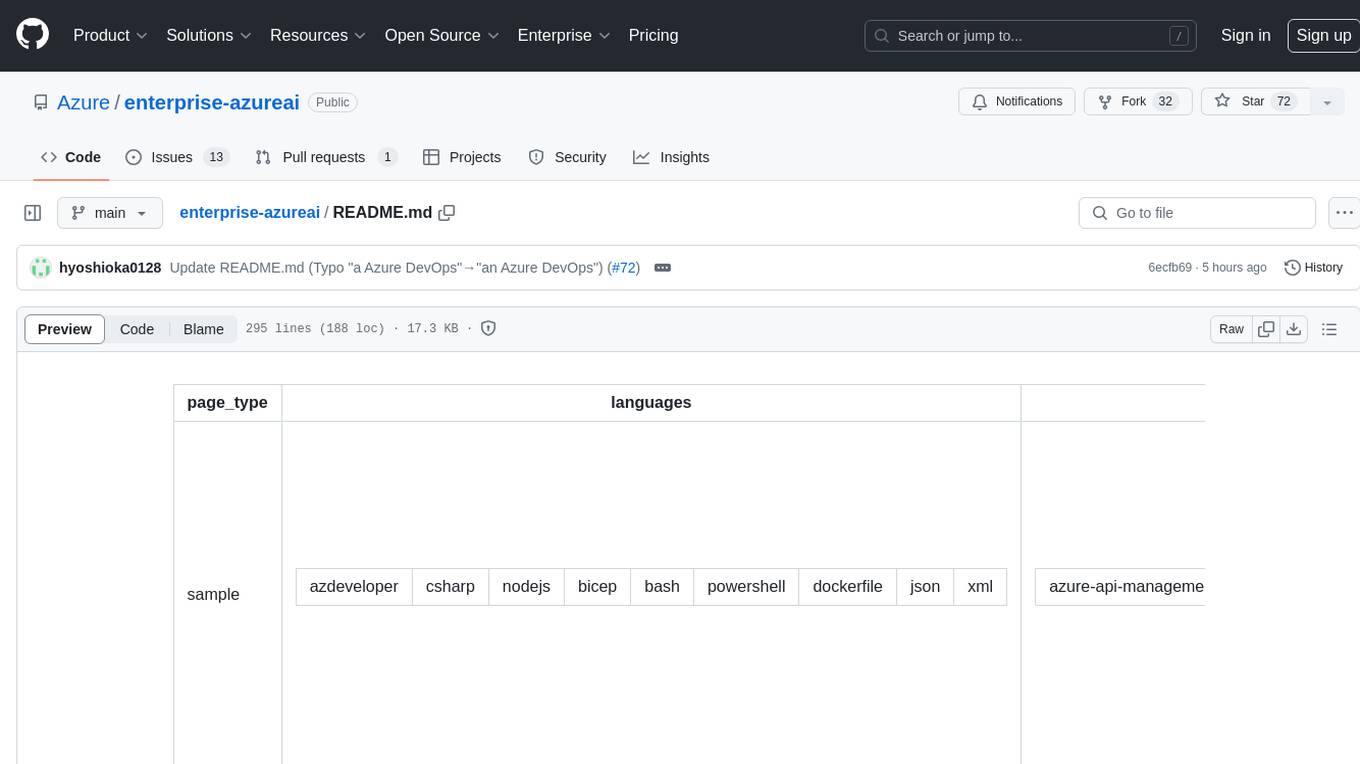
enterprise-azureai
Azure OpenAI Service is a central capability with Azure API Management, providing guidance and tools for organizations to implement Azure OpenAI in a production environment with an emphasis on cost control, secure access, and usage monitoring. It includes infrastructure-as-code templates, CI/CD pipelines, secure access management, usage monitoring, load balancing, streaming requests, and end-to-end samples like ChatApp and Azure Dashboards.
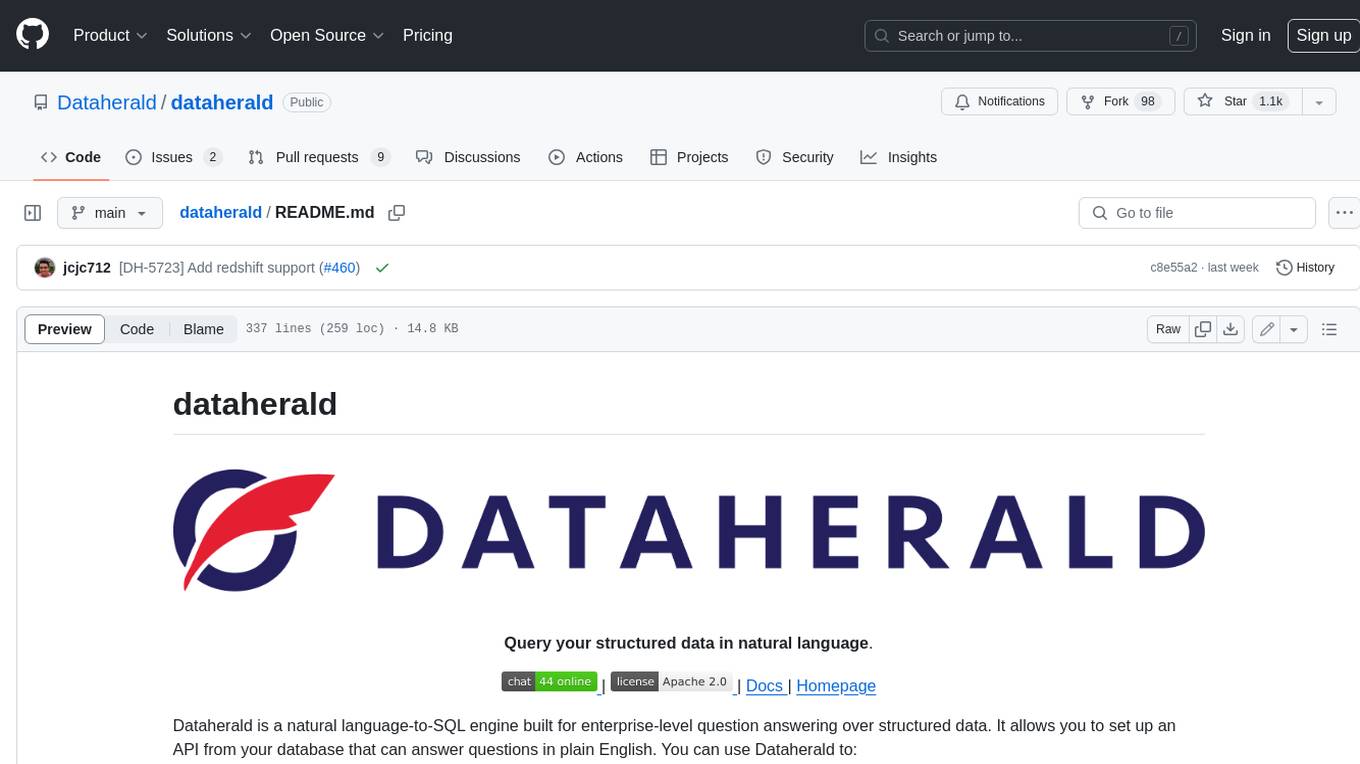
dataherald
Dataherald is a natural language-to-SQL engine built for enterprise-level question answering over structured data. It allows you to set up an API from your database that can answer questions in plain English. You can use Dataherald to: * Allow business users to get insights from the data warehouse without going through a data analyst * Enable Q+A from your production DBs inside your SaaS application * Create a ChatGPT plug-in from your proprietary data
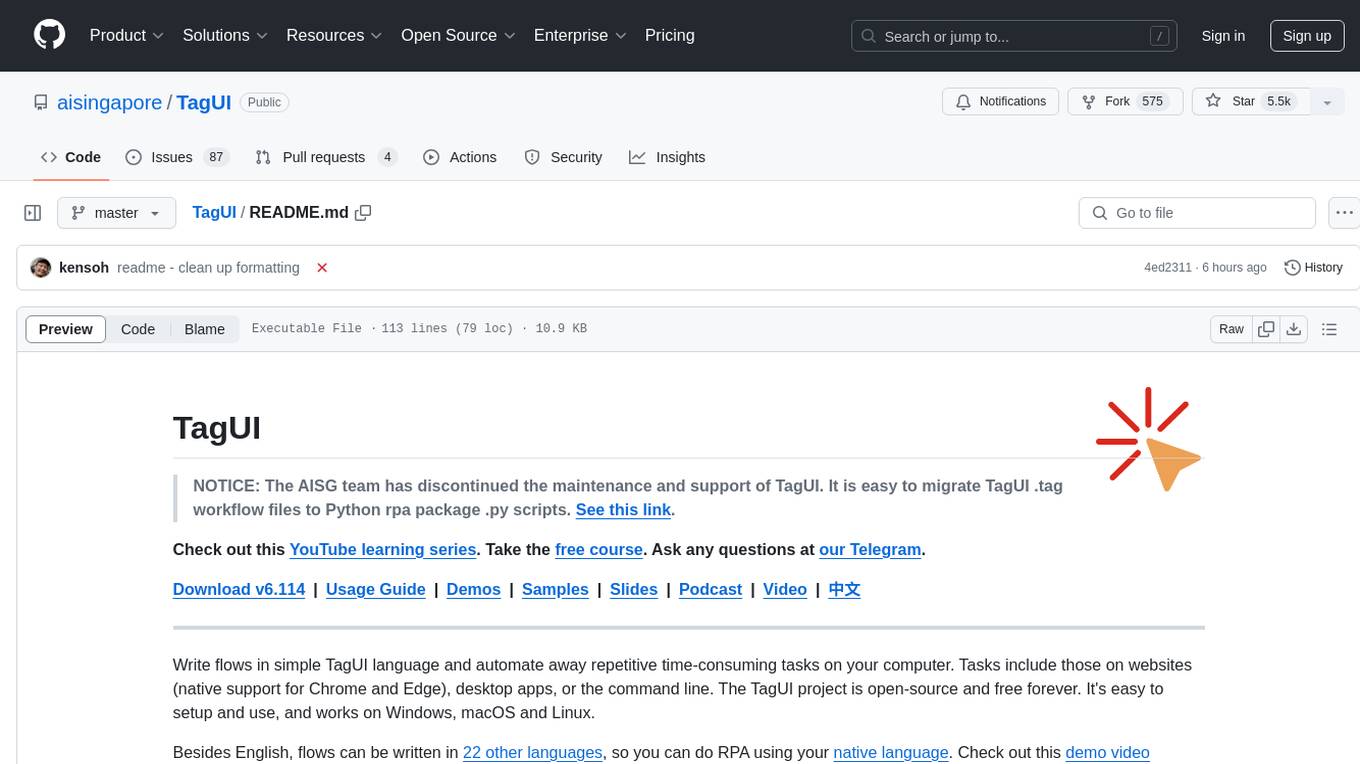
TagUI
TagUI is an open-source RPA tool that allows users to automate repetitive tasks on their computer, including tasks on websites, desktop apps, and the command line. It supports multiple languages and offers features like interacting with identifiers, automating data collection, moving data between TagUI and Excel, and sending Telegram notifications. Users can create RPA robots using MS Office Plug-ins or text editors, run TagUI on the cloud, and integrate with other RPA tools. TagUI prioritizes enterprise security by running on users' computers and not storing data. It offers detailed logs, enterprise installation guides, and support for centralised reporting.

NaLLM
The NaLLM project repository explores the synergies between Neo4j and Large Language Models (LLMs) through three primary use cases: Natural Language Interface to a Knowledge Graph, Creating a Knowledge Graph from Unstructured Data, and Generating a Report using static and LLM data. The repository contains backend and frontend code organized for easy navigation. It includes blog posts, a demo database, instructions for running demos, and guidelines for contributing. The project aims to showcase the potential of Neo4j and LLMs in various applications.
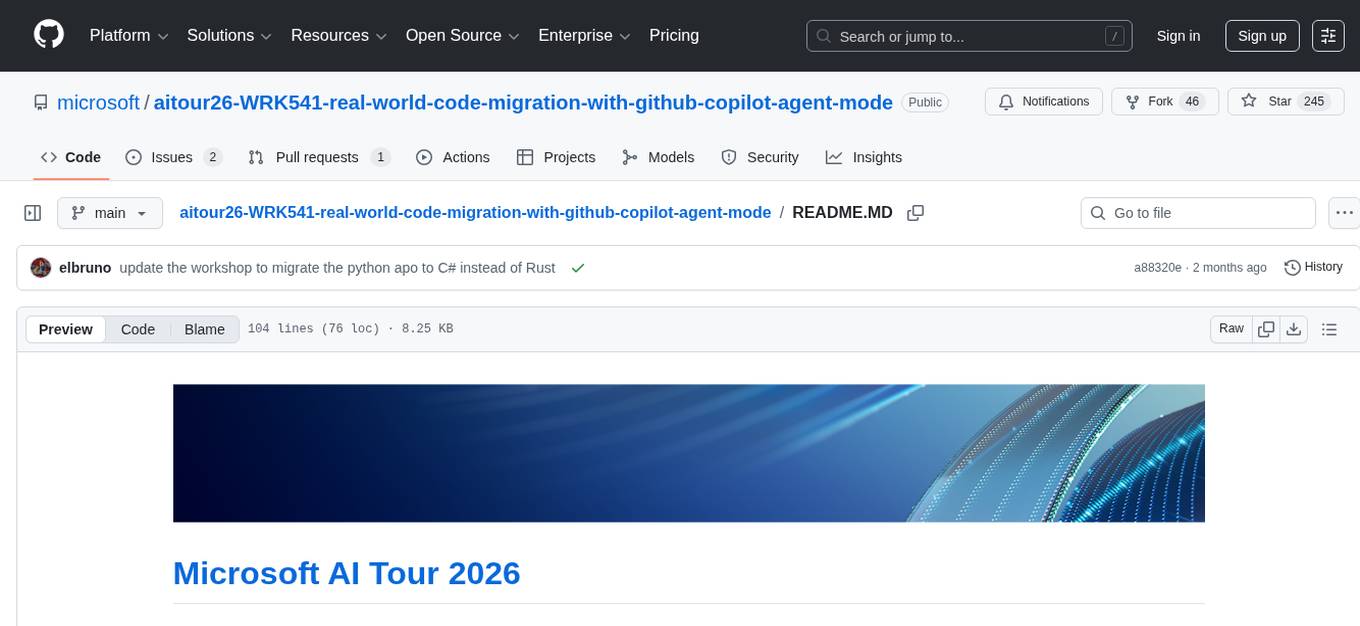
aitour26-WRK541-real-world-code-migration-with-github-copilot-agent-mode
Microsoft AI Tour 2026 WRK541 is a workshop focused on real-world code migration using GitHub Copilot Agent Mode. The session is designed for technologists interested in applying AI pair-programming techniques to challenging tasks like migrating or translating code between different programming languages. Participants will learn advanced GitHub Copilot techniques, differences between Python and C#, JSON serialization and deserialization in C#, developing and validating endpoints, integrating Swagger/OpenAPI documentation, and writing unit tests with MSTest. The workshop aims to help users gain hands-on experience in using GitHub Copilot for real-world code migration scenarios.
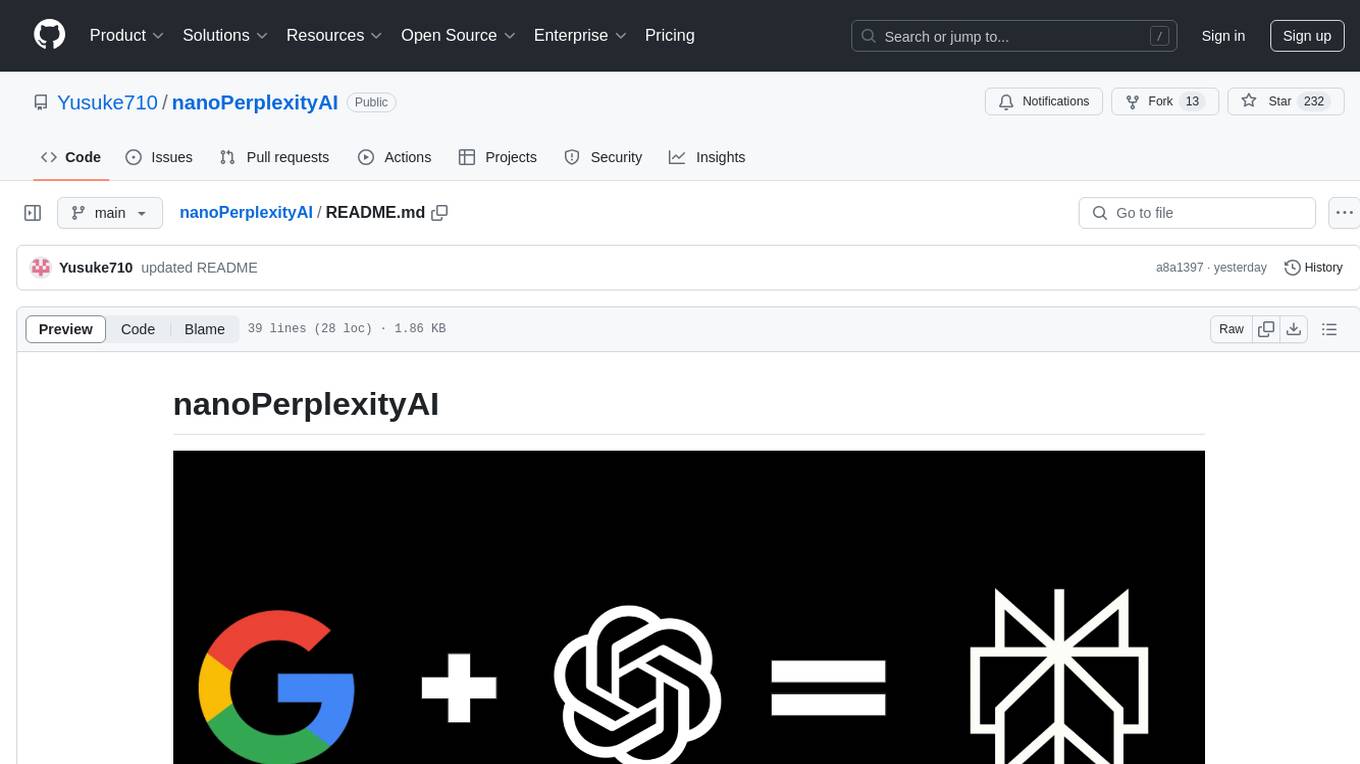
nanoPerplexityAI
nanoPerplexityAI is an open-source implementation of a large language model service that fetches information from Google. It involves a simple architecture where the user query is checked by the language model, reformulated for Google search, and an answer is generated and saved in a markdown file. The tool requires minimal setup and is designed for easy visualization of answers.
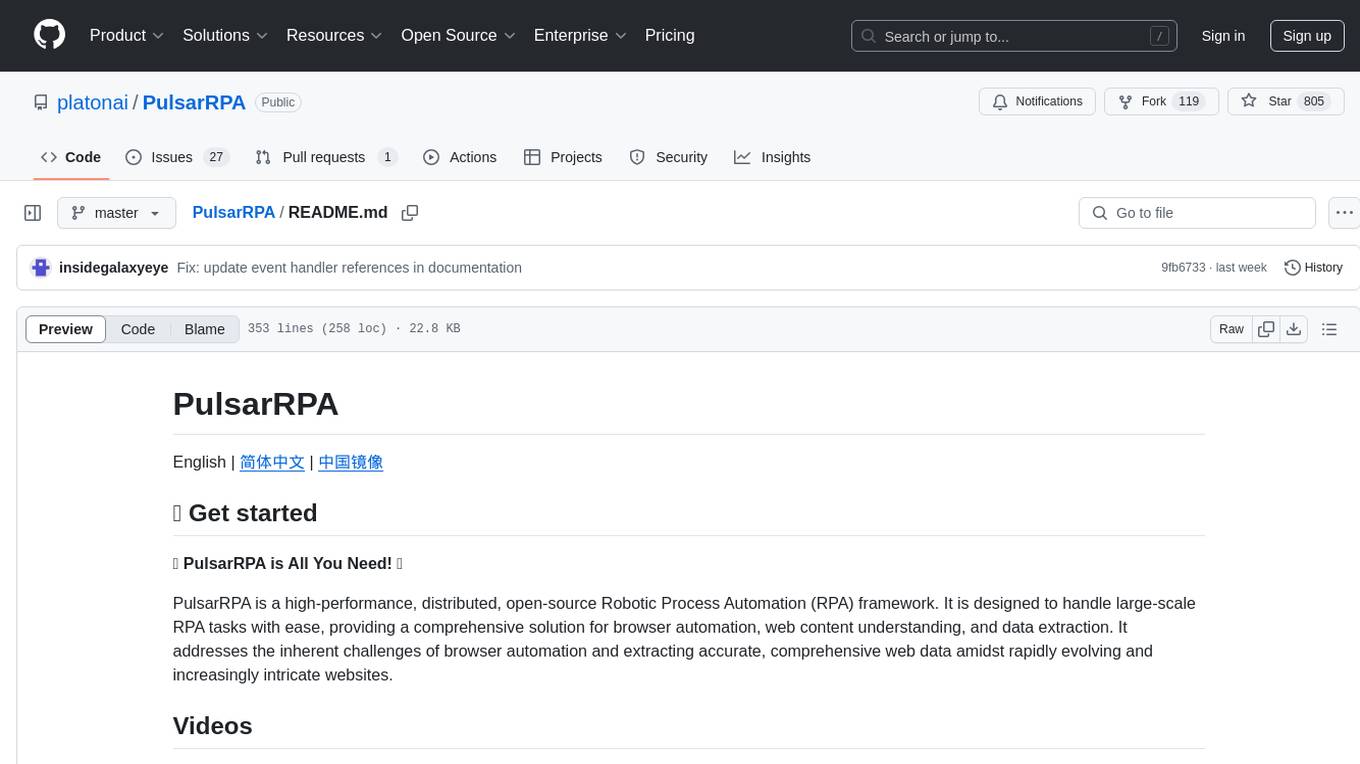
PulsarRPA
PulsarRPA is a high-performance, distributed, open-source Robotic Process Automation (RPA) framework designed to handle large-scale RPA tasks with ease. It provides a comprehensive solution for browser automation, web content understanding, and data extraction. PulsarRPA addresses challenges of browser automation and accurate web data extraction from complex and evolving websites. It incorporates innovative technologies like browser rendering, RPA, intelligent scraping, advanced DOM parsing, and distributed architecture to ensure efficient, accurate, and scalable web data extraction. The tool is open-source, customizable, and supports cutting-edge information extraction technology, making it a preferred solution for large-scale web data extraction.
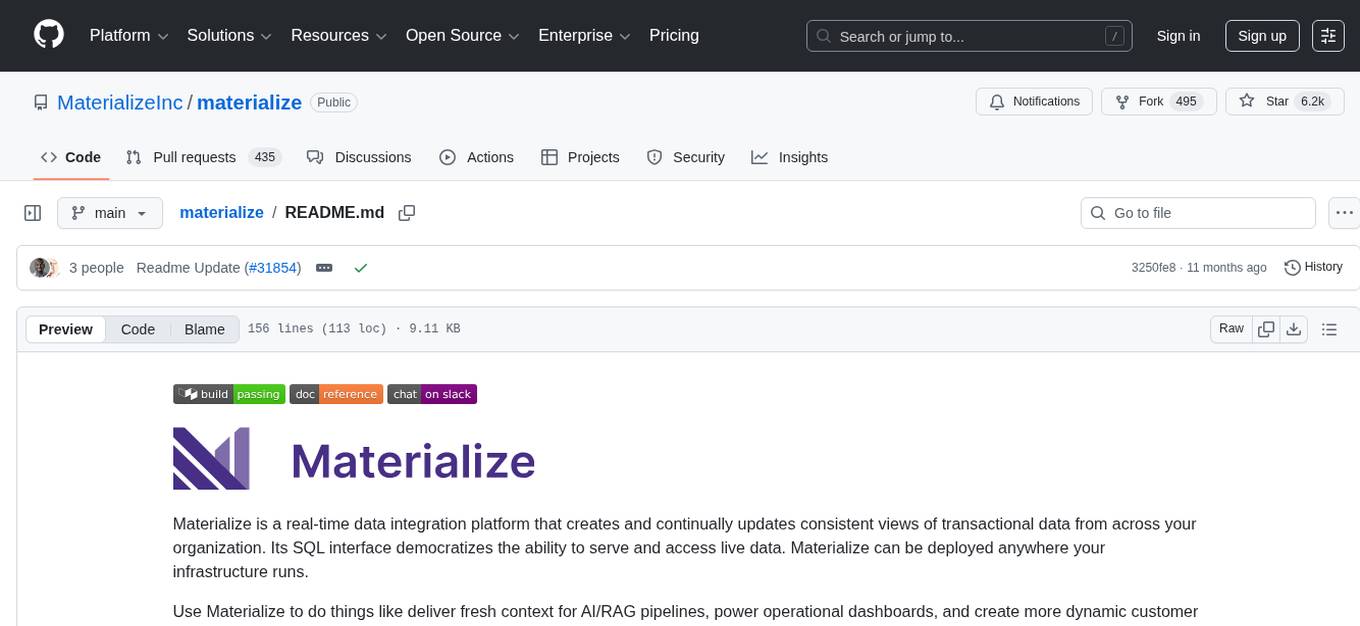
materialize
Materialize is a real-time data integration platform that creates and continually updates consistent views of transactional data from across your organization. Its SQL interface democratizes the ability to serve and access live data. Materialize can be deployed anywhere your infrastructure runs. Use Materialize to deliver fresh context for AI/RAG pipelines, power operational dashboards, and create more dynamic customer experiences without building time-consuming custom data pipelines. Materialize focuses on providing correct and consistent answers with minimal latency, and does not ask you to accept either approximate answers or eventual consistency. Materialize answers a query with the correct result on a specific version of your data. Materialize recasts SQL queries as dataflows, which can react efficiently to changes in your data as they happen. Materialize supports a large fraction of PostgreSQL features and is actively expanding support for more built-in PostgreSQL functions. Materialize can read data directly from PostgreSQL or MySQL replication stream, from Kafka, or from SaaS applications via webhooks. Once data is in, define views and perform reads via the PostgreSQL protocol. Materialize supports a comprehensive variety of SQL features, all using the PostgreSQL dialect and protocol. Materialize can incrementally maintain views in the presence of arbitrary inserts, updates, and deletes. Materialize supports recursion that enables incrementally updating tree and graph structures. Materialize is primarily written in Rust.
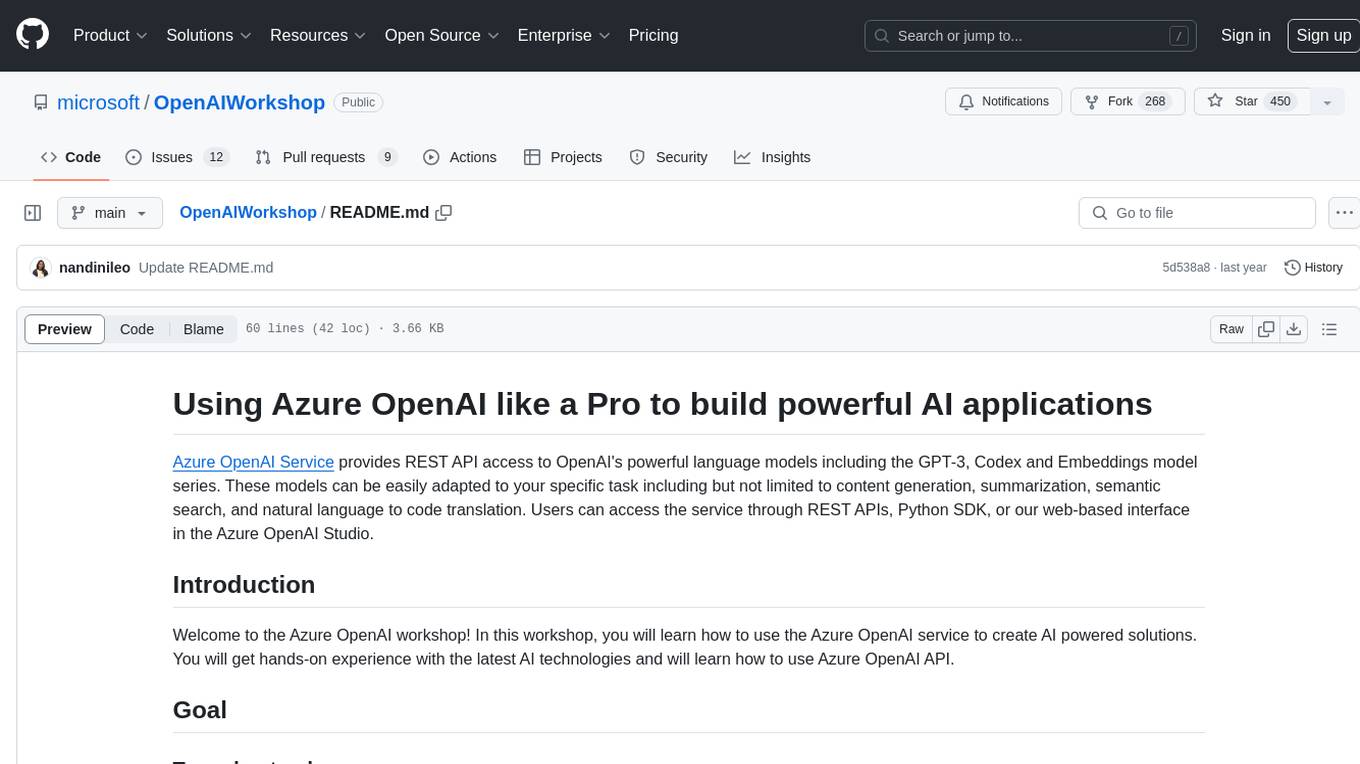
OpenAIWorkshop
Azure OpenAI Service provides REST API access to OpenAI's powerful language models including GPT-3, Codex and Embeddings. Users can easily adapt models for content generation, summarization, semantic search, and natural language to code translation. The workshop covers basics, prompt engineering, common NLP tasks, generative tasks, conversational dialog, and learning methods. It guides users to build applications with PowerApp, query SQL data, create data pipelines, and work with proprietary datasets. Target audience includes Power Users, Software Engineers, Data Scientists, and AI architects and Managers.
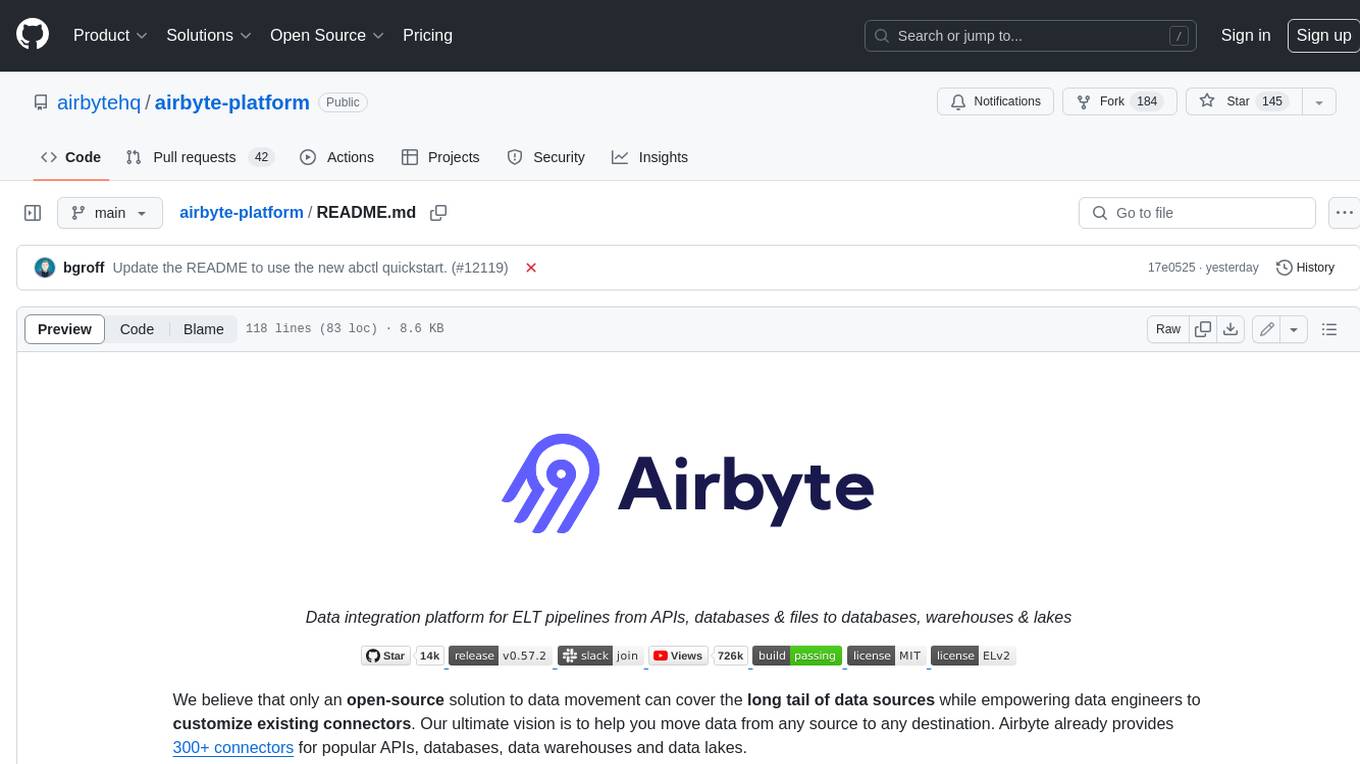
airbyte-platform
Airbyte is an open-source data integration platform that makes it easy to move data from any source to any destination. With Airbyte, you can build and manage data pipelines without writing any code. Airbyte provides a library of pre-built connectors that make it easy to connect to popular data sources and destinations. You can also create your own connectors using Airbyte's low-code Connector Development Kit (CDK). Airbyte is used by data engineers and analysts at companies of all sizes to move data for a variety of purposes, including data warehousing, data analysis, and machine learning.
For similar tasks

agentcloud
AgentCloud is an open-source platform that enables companies to build and deploy private LLM chat apps, empowering teams to securely interact with their data. It comprises three main components: Agent Backend, Webapp, and Vector Proxy. To run this project locally, clone the repository, install Docker, and start the services. The project is licensed under the GNU Affero General Public License, version 3 only. Contributions and feedback are welcome from the community.

zep-python
Zep is an open-source platform for building and deploying large language model (LLM) applications. It provides a suite of tools and services that make it easy to integrate LLMs into your applications, including chat history memory, embedding, vector search, and data enrichment. Zep is designed to be scalable, reliable, and easy to use, making it a great choice for developers who want to build LLM-powered applications quickly and easily.

lollms
LoLLMs Server is a text generation server based on large language models. It provides a Flask-based API for generating text using various pre-trained language models. This server is designed to be easy to install and use, allowing developers to integrate powerful text generation capabilities into their applications.
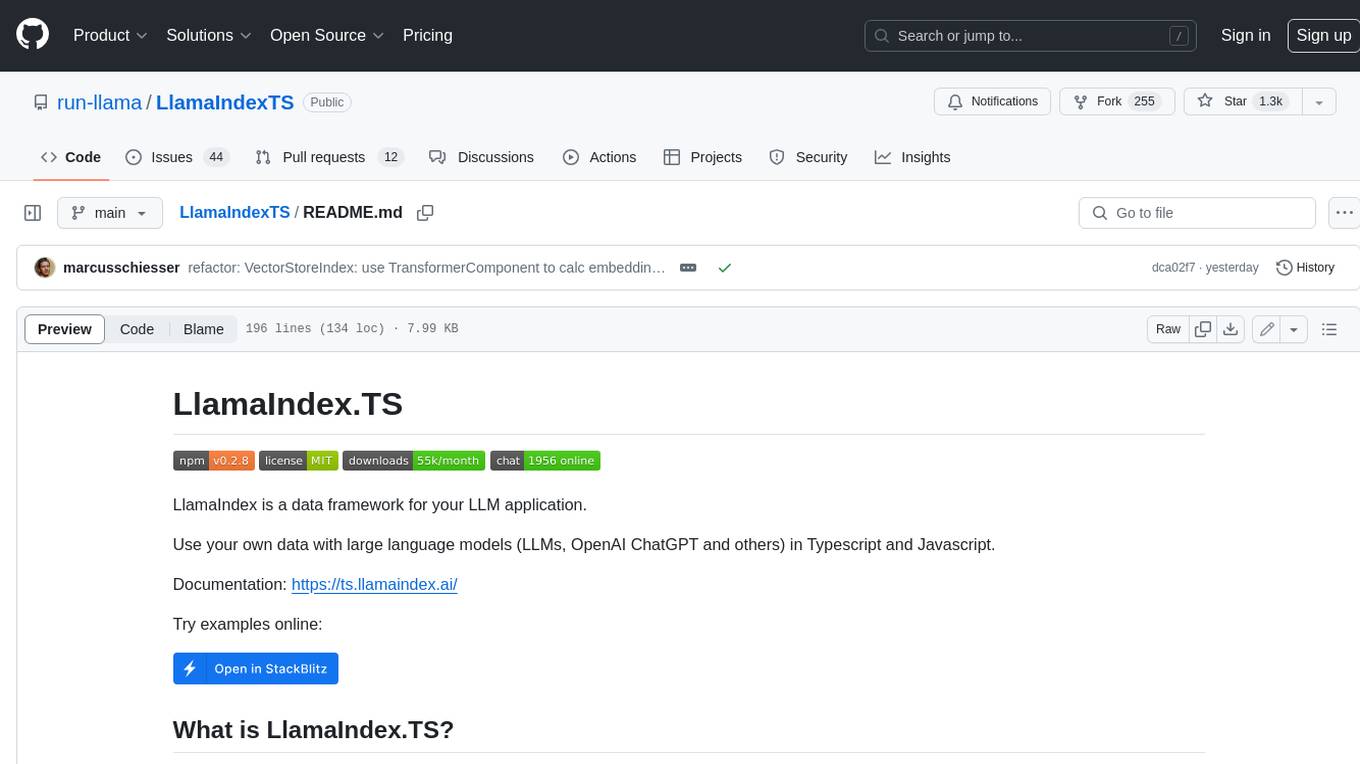
LlamaIndexTS
LlamaIndex.TS is a data framework for your LLM application. Use your own data with large language models (LLMs, OpenAI ChatGPT and others) in Typescript and Javascript.

semantic-kernel
Semantic Kernel is an SDK that integrates Large Language Models (LLMs) like OpenAI, Azure OpenAI, and Hugging Face with conventional programming languages like C#, Python, and Java. Semantic Kernel achieves this by allowing you to define plugins that can be chained together in just a few lines of code. What makes Semantic Kernel _special_ , however, is its ability to _automatically_ orchestrate plugins with AI. With Semantic Kernel planners, you can ask an LLM to generate a plan that achieves a user's unique goal. Afterwards, Semantic Kernel will execute the plan for the user.

botpress
Botpress is a platform for building next-generation chatbots and assistants powered by OpenAI. It provides a range of tools and integrations to help developers quickly and easily create and deploy chatbots for various use cases.
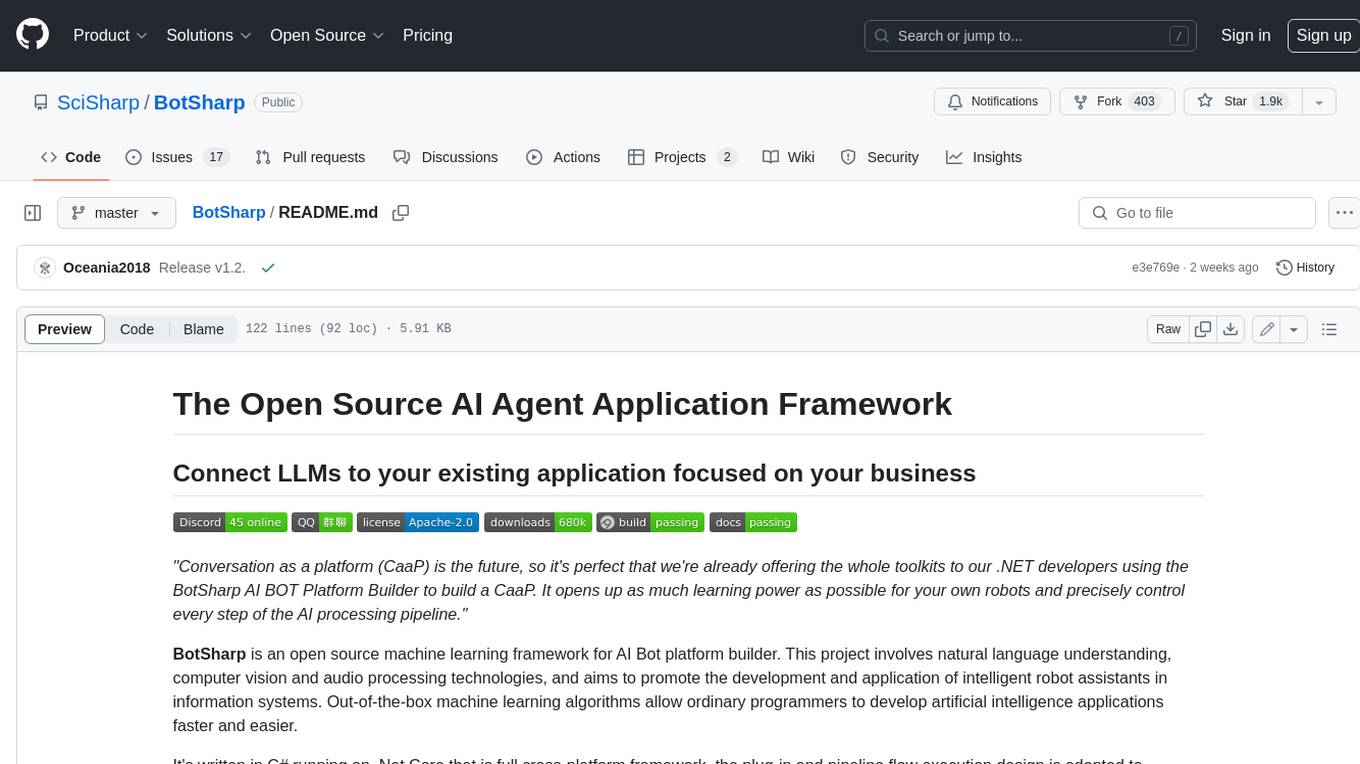
BotSharp
BotSharp is an open-source machine learning framework for building AI bot platforms. It provides a comprehensive set of tools and components for developing and deploying intelligent virtual assistants. BotSharp is designed to be modular and extensible, allowing developers to easily integrate it with their existing systems and applications. With BotSharp, you can quickly and easily create AI-powered chatbots, virtual assistants, and other conversational AI applications.

qdrant
Qdrant is a vector similarity search engine and vector database. It is written in Rust, which makes it fast and reliable even under high load. Qdrant can be used for a variety of applications, including: * Semantic search * Image search * Product recommendations * Chatbots * Anomaly detection Qdrant offers a variety of features, including: * Payload storage and filtering * Hybrid search with sparse vectors * Vector quantization and on-disk storage * Distributed deployment * Highlighted features such as query planning, payload indexes, SIMD hardware acceleration, async I/O, and write-ahead logging Qdrant is available as a fully managed cloud service or as an open-source software that can be deployed on-premises.
For similar jobs
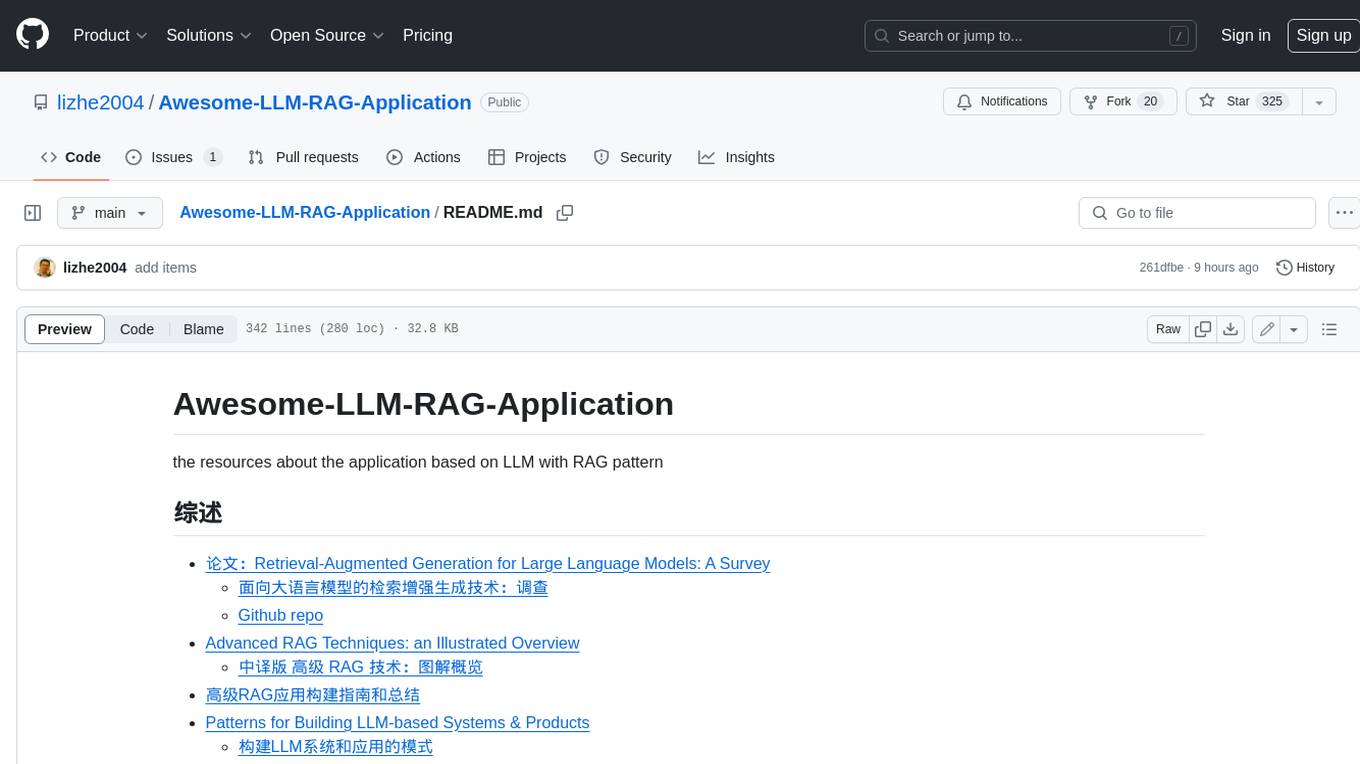
Awesome-LLM-RAG-Application
Awesome-LLM-RAG-Application is a repository that provides resources and information about applications based on Large Language Models (LLM) with Retrieval-Augmented Generation (RAG) pattern. It includes a survey paper, GitHub repo, and guides on advanced RAG techniques. The repository covers various aspects of RAG, including academic papers, evaluation benchmarks, downstream tasks, tools, and technologies. It also explores different frameworks, preprocessing tools, routing mechanisms, evaluation frameworks, embeddings, security guardrails, prompting tools, SQL enhancements, LLM deployment, observability tools, and more. The repository aims to offer comprehensive knowledge on RAG for readers interested in exploring and implementing LLM-based systems and products.
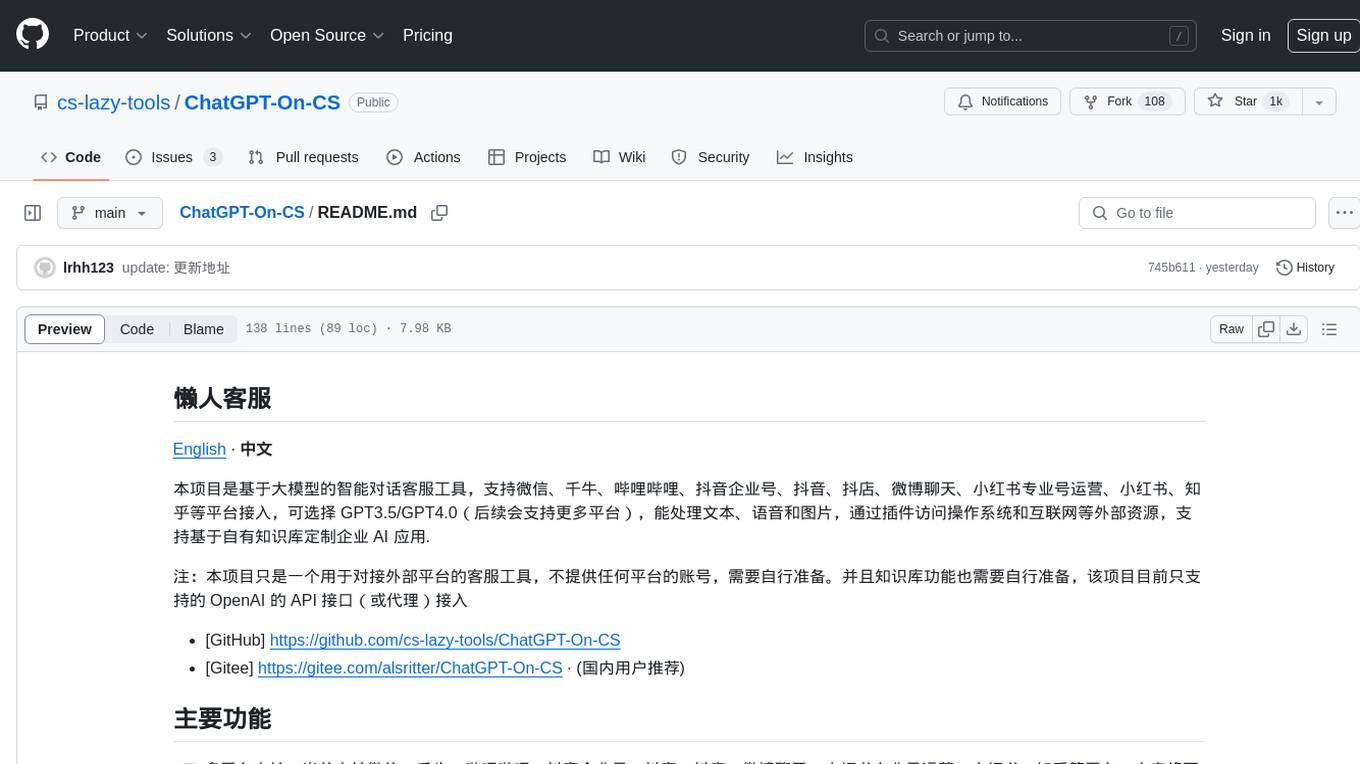
ChatGPT-On-CS
ChatGPT-On-CS is an intelligent chatbot tool based on large models, supporting various platforms like WeChat, Taobao, Bilibili, Douyin, Weibo, and more. It can handle text, voice, and image inputs, access external resources through plugins, and customize enterprise AI applications based on proprietary knowledge bases. Users can set custom replies, utilize ChatGPT interface for intelligent responses, send images and binary files, and create personalized chatbots using knowledge base files. The tool also features platform-specific plugin systems for accessing external resources and supports enterprise AI applications customization.
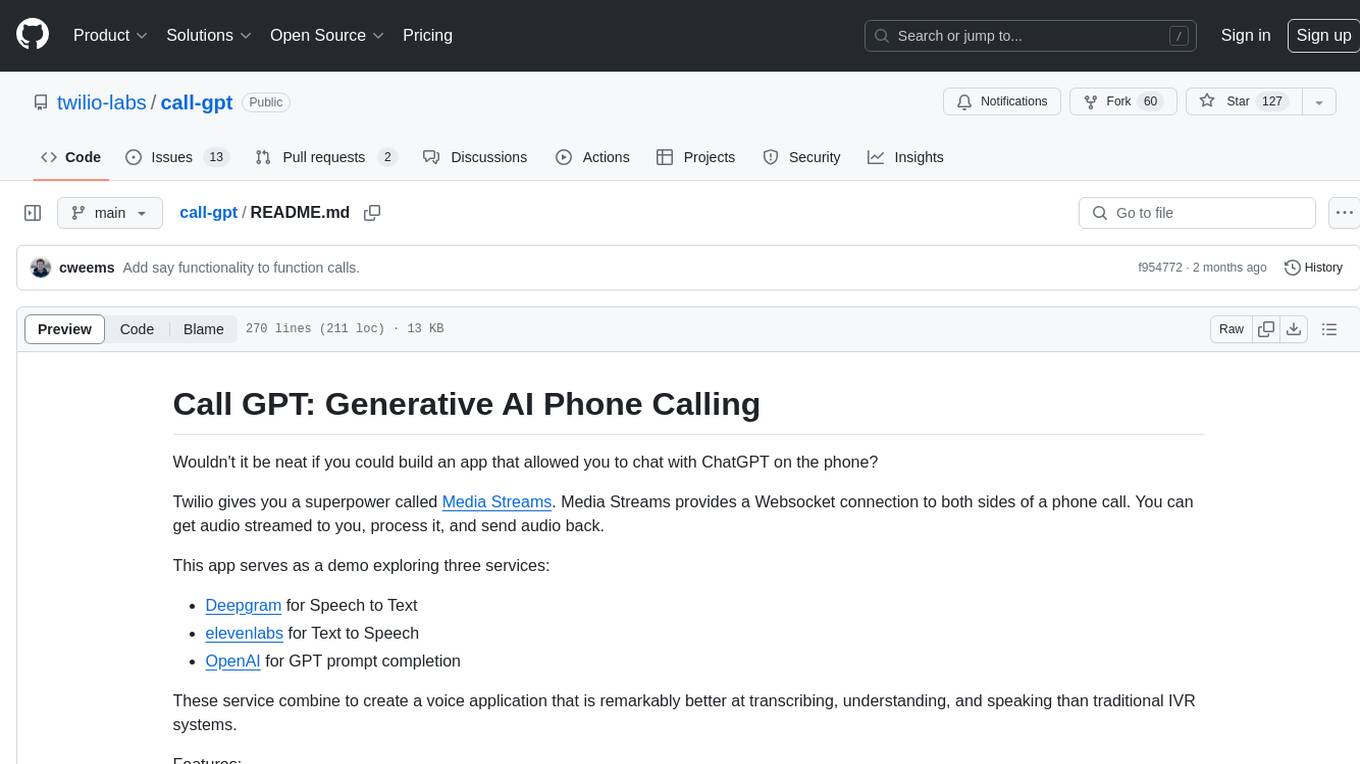
call-gpt
Call GPT is a voice application that utilizes Deepgram for Speech to Text, elevenlabs for Text to Speech, and OpenAI for GPT prompt completion. It allows users to chat with ChatGPT on the phone, providing better transcription, understanding, and speaking capabilities than traditional IVR systems. The app returns responses with low latency, allows user interruptions, maintains chat history, and enables GPT to call external tools. It coordinates data flow between Deepgram, OpenAI, ElevenLabs, and Twilio Media Streams, enhancing voice interactions.
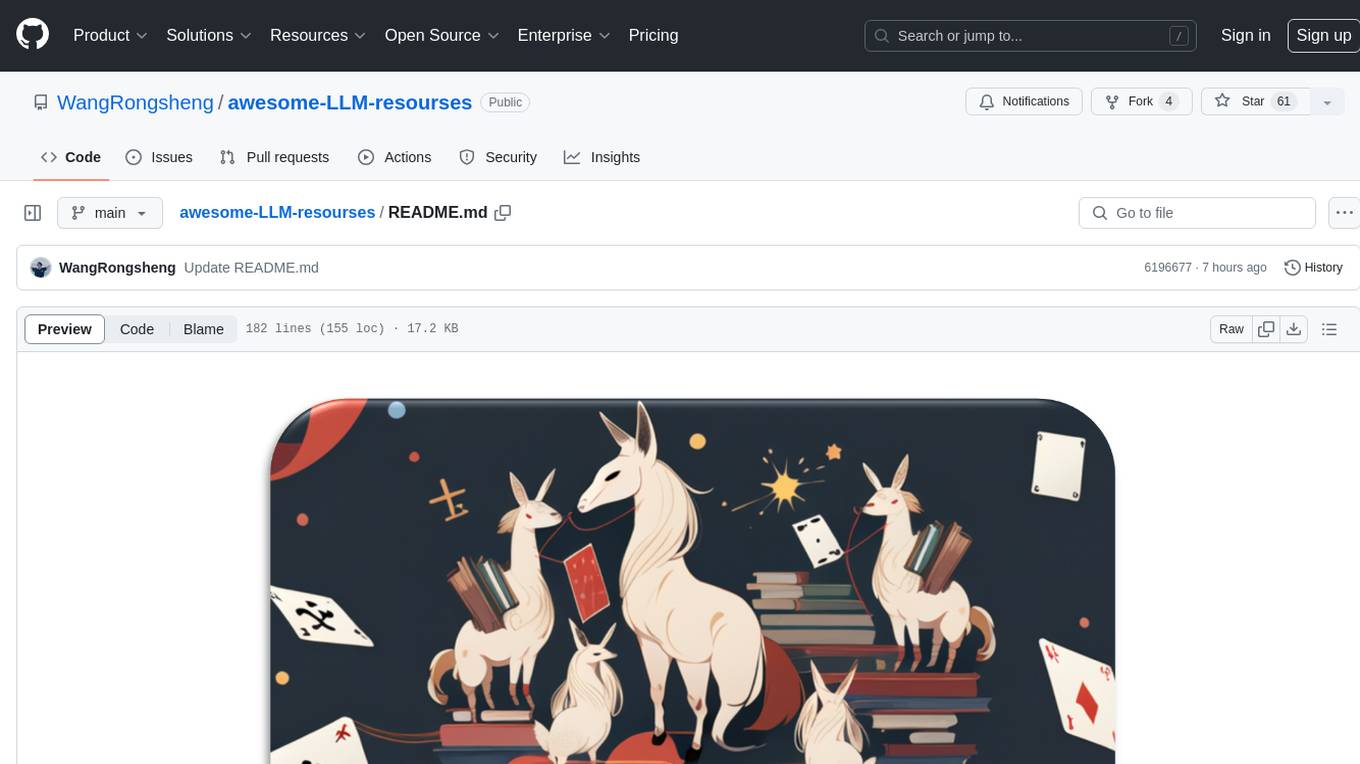
awesome-LLM-resourses
A comprehensive repository of resources for Chinese large language models (LLMs), including data processing tools, fine-tuning frameworks, inference libraries, evaluation platforms, RAG engines, agent frameworks, books, courses, tutorials, and tips. The repository covers a wide range of tools and resources for working with LLMs, from data labeling and processing to model fine-tuning, inference, evaluation, and application development. It also includes resources for learning about LLMs through books, courses, and tutorials, as well as insights and strategies from building with LLMs.
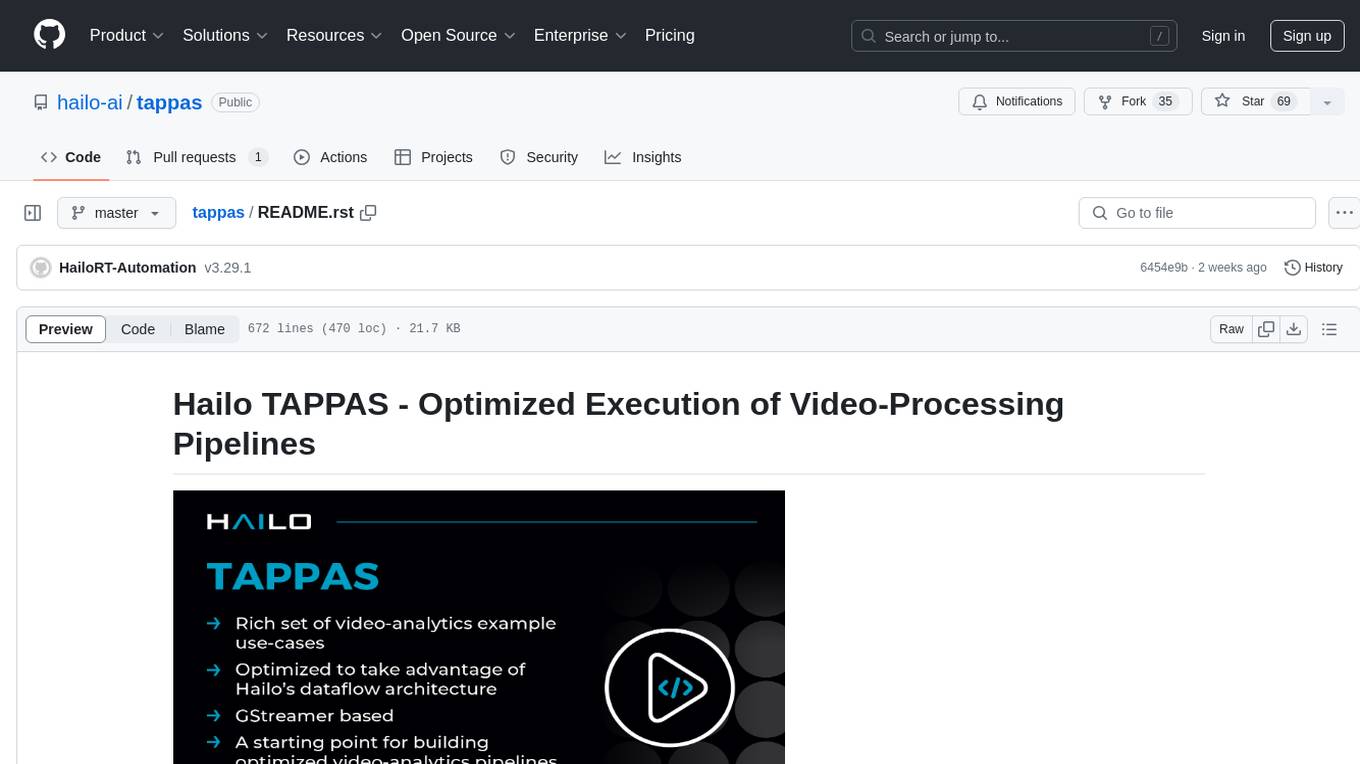
tappas
Hailo TAPPAS is a set of full application examples that implement pipeline elements and pre-trained AI tasks. It demonstrates Hailo's system integration scenarios on predefined systems, aiming to accelerate time to market, simplify integration with Hailo's runtime SW stack, and provide a starting point for customers to fine-tune their applications. The tool supports both Hailo-15 and Hailo-8, offering various example applications optimized for different common hosts. TAPPAS includes pipelines for single network, two network, and multi-stream processing, as well as high-resolution processing via tiling. It also provides example use case pipelines like License Plate Recognition and Multi-Person Multi-Camera Tracking. The tool is regularly updated with new features, bug fixes, and platform support.
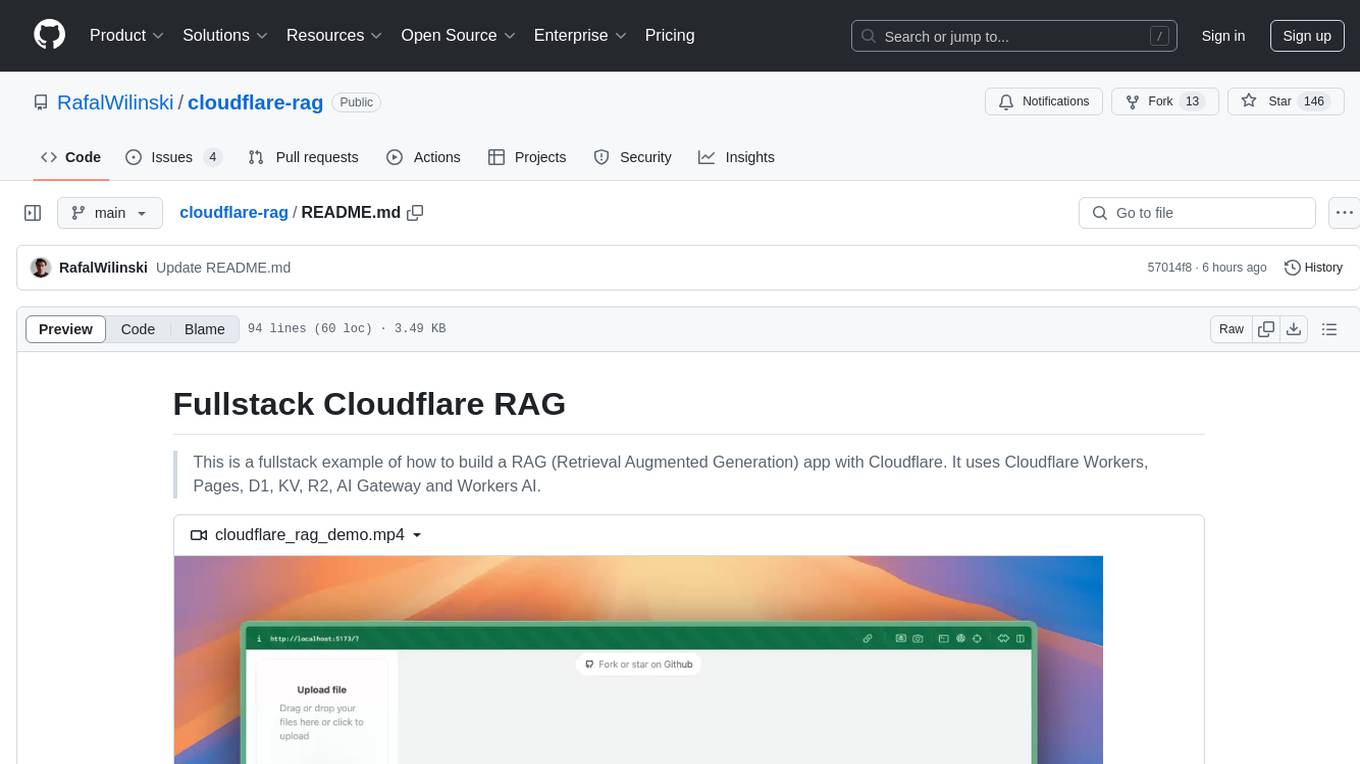
cloudflare-rag
This repository provides a fullstack example of building a Retrieval Augmented Generation (RAG) app with Cloudflare. It utilizes Cloudflare Workers, Pages, D1, KV, R2, AI Gateway, and Workers AI. The app features streaming interactions to the UI, hybrid RAG with Full-Text Search and Vector Search, switchable providers using AI Gateway, per-IP rate limiting with Cloudflare's KV, OCR within Cloudflare Worker, and Smart Placement for workload optimization. The development setup requires Node, pnpm, and wrangler CLI, along with setting up necessary primitives and API keys. Deployment involves setting up secrets and deploying the app to Cloudflare Pages. The project implements a Hybrid Search RAG approach combining Full Text Search against D1 and Hybrid Search with embeddings against Vectorize to enhance context for the LLM.
pixeltable
Pixeltable is a Python library designed for ML Engineers and Data Scientists to focus on exploration, modeling, and app development without the need to handle data plumbing. It provides a declarative interface for working with text, images, embeddings, and video, enabling users to store, transform, index, and iterate on data within a single table interface. Pixeltable is persistent, acting as a database unlike in-memory Python libraries such as Pandas. It offers features like data storage and versioning, combined data and model lineage, indexing, orchestration of multimodal workloads, incremental updates, and automatic production-ready code generation. The tool emphasizes transparency, reproducibility, cost-saving through incremental data changes, and seamless integration with existing Python code and libraries.
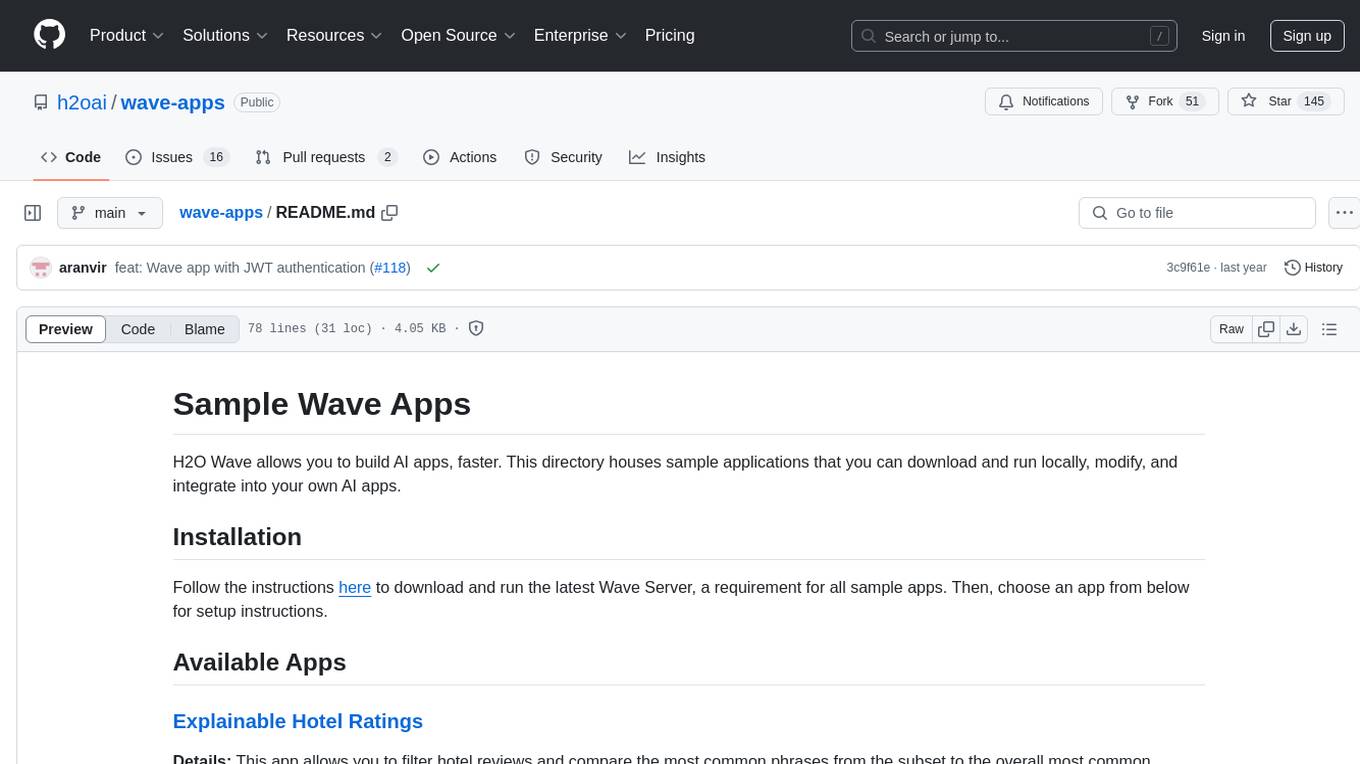
wave-apps
Wave Apps is a directory of sample applications built on H2O Wave, allowing users to build AI apps faster. The apps cover various use cases such as explainable hotel ratings, human-in-the-loop credit risk assessment, mitigating churn risk, online shopping recommendations, and sales forecasting EDA. Users can download, modify, and integrate these sample apps into their own projects to learn about app development and AI model deployment.